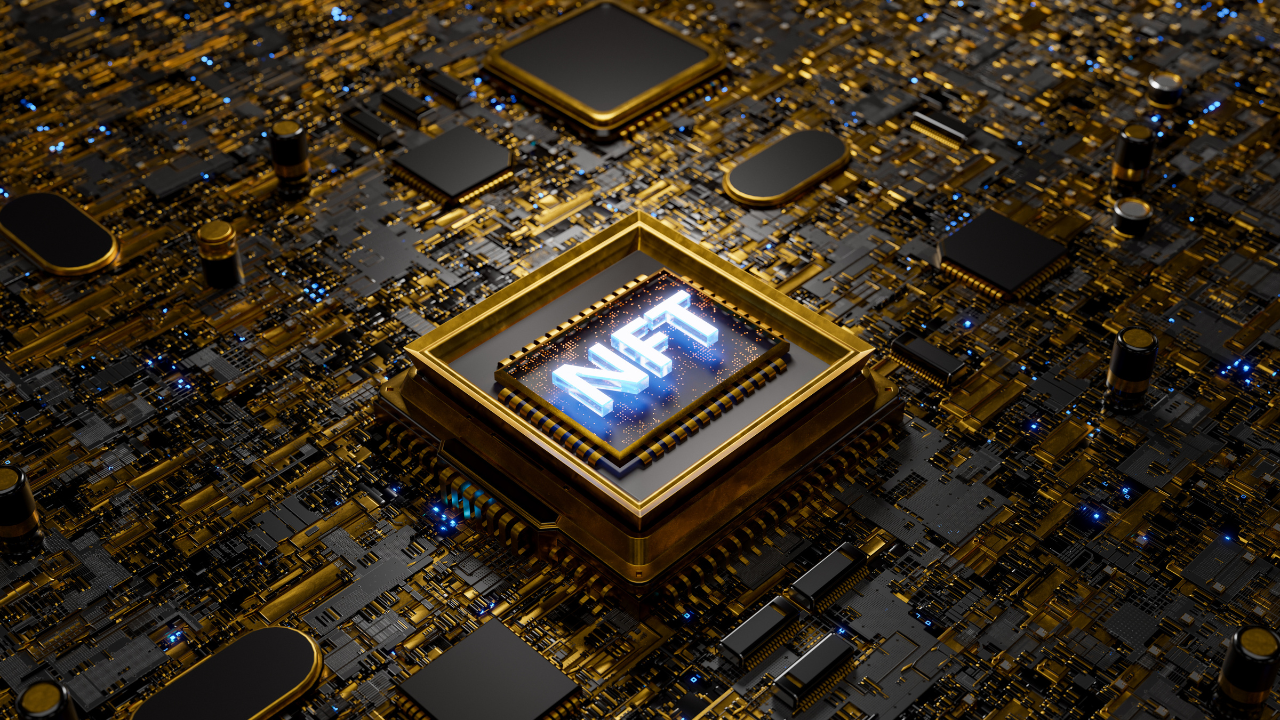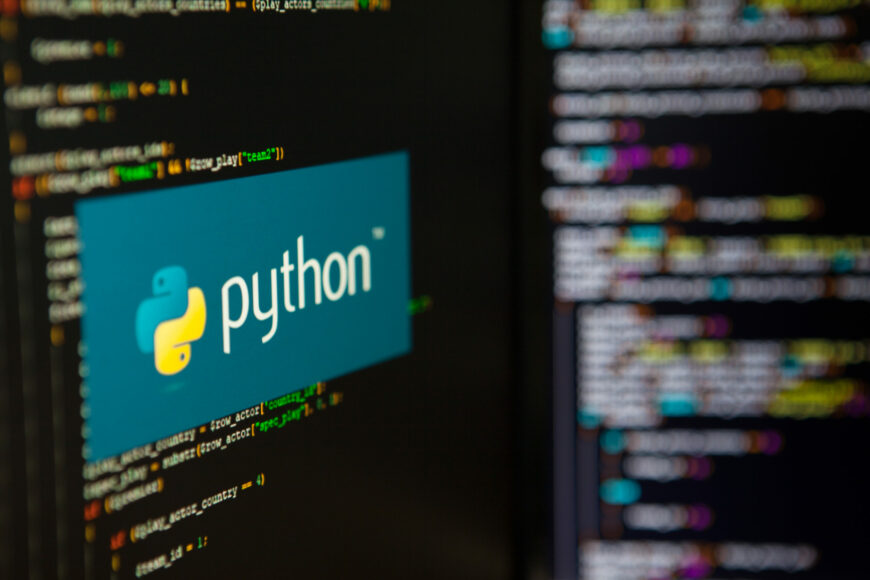Are you ready to work on your NFT Business Models and join the NFT revolution? NFTs have taken the world by storm, and they are quickly becoming a popular way for businesses to monetize their digital assets. From virtual real estate to collectables and even loans, NFTs have opened up a whole new world of possibilities.
But with so many different NFT business models out there, it can be hard to know where to start. That’s why we’ve put together a list of the top 10 NFT business models you need to know about in 2023.
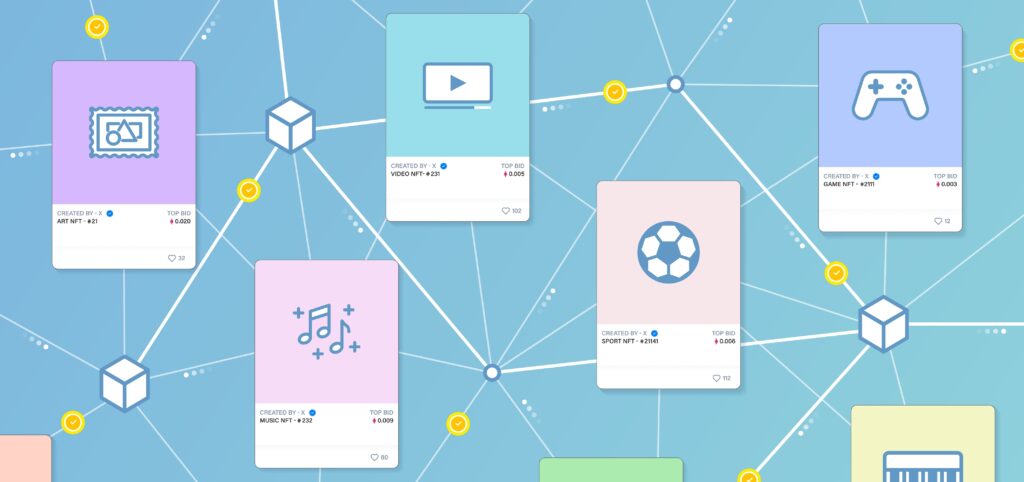
Whether you’re a creator, investor, or just curious about this exciting new technology, you won’t want to miss out on these opportunities. From NFT marketplaces to NFT lending platforms, these are the business models that are set to take the NFT world by storm in the coming year. So get ready to dive in and discover the latest and greatest models in NFT technology!
What are NFTs & How Do They Work?
NFTs are a type of digital asset. They represent ownership or proof of authenticity of a unique item or piece of content such as art, music, videos, virtual real estate and more.
Each NFT is unique and cannot be replicated, traded or replaced. NFTs use blockchain technology. Its decentralized and digital ledger functions verify the authenticity and ownership of the NFT. Later, these NFTs are stored on the blockchain. It creates a permanent and unchangeable record of the NFT’s existence and ownership. Thus making it a secure and tamper-proof way to own and trade digital assets.
Related Post: How to Become an NFT Expert?
How NFTs are Profitable for Businesses?
Businesses can enjoy NFTs in many ways such as monetizing unique digital assets, creating new revenue streams, and engaging with customers in new and exciting ways.
For example, in the gaming industry, companies like Axie Infinity and The Sandbox have created NFTs as in-game items, allowing players to own and trade unique virtual items. This not only creates new revenue streams for the game developers but also provides players with a sense of ownership and investment in the game.
In the art world, artists and galleries can sell NFTs of digital artworks, providing a new way for artists to monetize their work and for collectors to own one-of-a-kind pieces.
In the music industry, musicians like Kings of Leon and Grimes have sold NFTs of their music, merchandise, and concert experiences, providing a new way for them to monetize their work and for fans to own a piece of their favourite artist’s legacy.
In the real estate industry, companies like OpenSea have created an NFT marketplace to allow people to buy or sell virtual or real-world land following a paperless process worldwide.
As the NFT market continues to grow and evolve, there are many NFT business models that entrepreneurs and creators can consider when starting their ventures. Some of the NFT Bunisess models are explained in the next section. You can hire an NFT Expert who can help you in developing a top-notch NFT marketplace.
Top 10 NFT Business Models
NFT Business Models – Develop an NFT Collectible Marketplaces
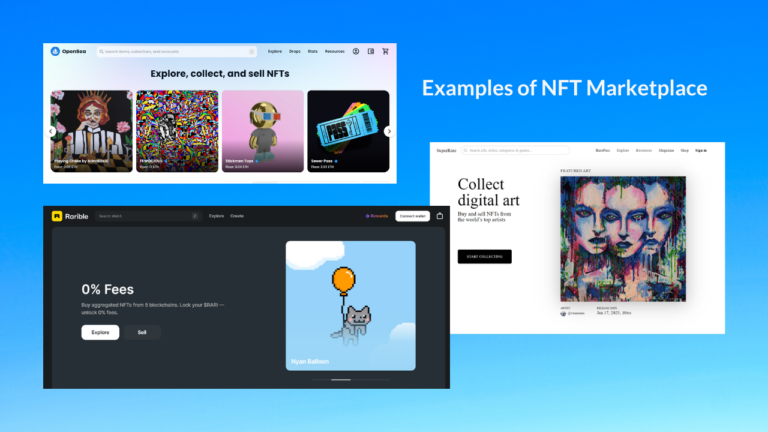
NFT Collectibles’ business model is the sale of unique digital collectable items verified and tracked on a blockchain. These collectables can include anything from virtual trading cards, in-game items, digital art, and virtual real estate. This business model uses NFTs to create scarcity and exclusivity for digital items, which in turn increases their value.
To create an NFT Collectibles business, start by identifying a niche market. Use technologies like Ethereum, Polygon, and Avalanche to create your NFT collectable marketplace. Create unique and limited digital collectables and list them on your NFT marketplace. Some functions of an NFT Marketplace are listing, minting, transaction fees, etc.
It is the most promising idea of 2023. But you will have tough competitors like Opensea, SuperRare, Rarible, Axie Infinity, and others.
NFT Business Models – Develop an NFT Gaming Platform
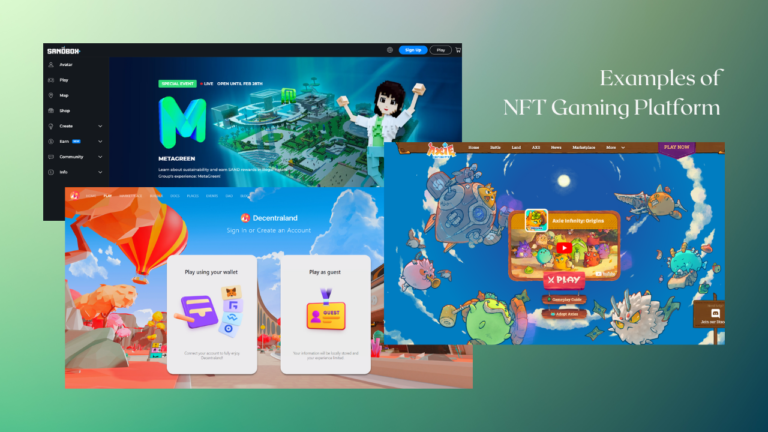
The NFT Gaming business model is the use of NFTs to create new monetization opportunities in the gaming industry. NFTs allow players to purchase and own unique in-game items such as weapons, armour, and vehicles. These items can be used within the game and also can be traded or sold on the open market.
The use of non-fungible tokens (NFTs) in the gaming industry has opened up new monetization opportunities. Companies such as Enjin, Draper Labs, Alwaysgeeky, and Gala Games have a strong fan base and a reputation for creating innovative and engaging NFT games.
If you want to enter the NFT gaming space, it can be useful to draw inspiration from these industry leaders. One key consideration is to diversify your offering by creating games across different genres and experimenting with different earning mechanisms such as Move-to-earn (M2E), Play-to-earn (P2E), and NFT rentals.
It’s also important to keep in mind that the cost of developing an NFT gaming marketplace can be higher than expected, but the long-term potential for growth and revenue can justify the investment. It’s essential to conduct thorough research, stay informed about the latest developments, and work with experienced professionals in the field to ensure a successful launch.
NFT Business Models – Develop a Metaverse NFT Platform
The Metaverse NFT business model is the use of non-fungible tokens (NFTs) to create virtual worlds that users can explore and interact with. This can include everything from virtual real estate to virtual experiences such as concerts and events, or even virtual socializing.
The use of NFTs in virtual worlds, built on blockchain networks, allows users to connect and interact using technologies such as AR and VR. Examples of successful metaverse NFTs include The Sandbox and Decentraland, which have generated substantial profits by selling virtual lands. Decentraland, in particular, provides creators with the ability to develop their own metaverse using the in-built currency, Mana.
The Metaverse NFT business model can offer various benefits such as creating new revenue streams, increasing user engagement and retention, and providing a new way for users to own and trade digital assets. It can also open up new opportunities for collaboration between game developers, publishers, and the NFT marketplaces.
The metaverse is still in its infancy, but it’s an exciting new frontier for digital assets and has the potential to change the way we interact and engage with the digital world.
Related Post: Metaverse vs Multiverse: Key Differences and Comparison
NFT Business Models – Create an NFT Social Media Platform
The growing interest in non-fungible tokens (NFTs) is a great opportunity to develop an NFT community. This community can serve as a platform for individuals to share knowledge, ask questions, and collaborate on various NFT-related projects. To start, you can hire an NFT development company to create and maintain the NFT community platform.
The NFT industry can be confusing for many individuals, and an NFT community can help to alleviate this if you provide a space for people to learn, engage and connect. You can model it after popular platforms such as Discord and Twitter.
Creating a platform for easy navigation will attract people for participating and sharing their ideas, connecting and collaborating with other members. It is important for the platform to have features like premium membership, branding and marketing, polls, and user connection to retain members.
NFT Business Models – Develop an NFT Minting Platform
An NFT Minting Platform business model offers a unique opportunity for creators and collectors to mint, trade, and monetize their digital assets. This business model creates a new level of accessibility for creators and collectors to mint and trade NFTs.
Many NFT marketplaces currently support digital creators by providing them with the tools to mint their valuable works of art in the form of NFTs, allowing them to assign a suitable value to their artwork through trading. The success and revenue potential of the market is directly proportional to the number of minted NFTs.
To launch an NFT minting platform, hire experienced NFT developers to develop your platform, and integrate features such as multiple categories of minting, and a smooth and user-friendly interface. With an NFT minting platform, creators can not only trade their digital assets but also sell or purchase them. Additionally, businesses can also pay artwork owners a fraction of future sales. This business model can be a great opportunity for those looking to enter the NFT industry.
NFT Business Models – Develop An NFT Music Platform
An NFT music business model is a way for musicians and music rights holders to monetize their work in a new way by creating and selling unique digital assets, such as music videos, album artwork, and even individual songs as NFTs. These NFTs can be bought, sold, and traded like physical assets, but with the added benefits of digital ownership and verifiability.
To create an NFT music business, you should have music and other digital assets to sell, a platform to sell it on, and a way to mint and manage the NFTs. Some popular platforms for selling NFTs include YellowHeart, Audius, and OpenSea. The benefits of this type of business model include the ability to monetize unique digital assets, and the ability to prove ownership and authenticity of the asset. Additionally, NFT music also opens up new opportunities for musicians, such as the ability to tokenize their work and potentially earn royalties on resales, and for fans to own a piece of the artist’s work that is unique and verifiable on the blockchain.
NFT Business Models – Develop NFT Real Estate
An NFT real estate business model is a way for property owners, developers, and real estate agents to monetize their work in a new way by creating and selling digital assets, such as virtual property, digital land, and other real estate-related digital collectables, as NFTs.
By utilizing the power of blockchain technology, NFTs can facilitate a paperless and intermediary-free process for buying and selling both virtual and physical property worldwide. This not only improves the efficiency of the real estate industry but also opens up new opportunities for investment and profit-making. With the help of a reliable NFT development firm, businesses can take advantage of NFT smart contract services to facilitate secure and seamless transactions. As the metaverse continues to expand, the NFT real estate business is becoming an increasingly attractive investment opportunity, offering a unique and innovative way to participate in the real estate market.
NFT Business Models – NFT Loan Platform
An NFT loan platform business model is a way for borrowers and lenders to engage in peer-to-peer lending using NFTs as collateral. The platform allows borrowers to put up their NFTs as collateral in exchange for a loan and lenders to provide loans while minimizing the risk of default.
The integration of NFTs and decentralized finance (Defi) applications is becoming increasingly popular among business enthusiasts worldwide. By partnering with a prominent Defi development company, businesses are able to create innovative platforms, such as NFT loan platforms, that combine the strengths of both technologies.
To be successful in the NFT loan business, companies are hiring blockchain developers to utilize smart contracts and blockchain technology, allowing users to borrow money using NFT collectables without the need for intermediaries.
The integration of NFTs and Defi systems is an exciting development that is gaining traction as the world moves towards decentralized finance. The NFT loan platform business model is among the top NFT business models as it provides more lending opportunities, more security, and more flexibility to the users.
NFT Business Models – NFT Staking Platform
An NFT staking platform business model is a way for NFT holders to earn rewards for holding and “staking” their NFTs on a platform. This is similar to the concept of staking in the cryptocurrency world, where holders can earn rewards for holding and supporting the network.
The benefits of this type of business model include the ability to earn rewards for holding and supporting the network, the ability to prove ownership and authenticity of the asset, and the potential for increased value over time.
The NFT staking platform business model allows users to secure their NFTs for a period of time in exchange for rewards or cash. This demonstrates that liquidity does exist in the NFT world, and it also allows users to earn passive income by staking their NFTs. The NFT staking platform operates on a proof-of-stake (PoS) model to reduce energy costs, unlike the energy-intensive proof-of-work (POW) model.
As NFTs continue to gain popularity, many enthusiasts are turning to blockchain development services to create NFT staking platforms. These platforms are already being integrated into various play-to-earn blockchain games, such as The Sandbox, Axie Infinity, and Splinterlands.
To get started with an NFT staking platform, businesses can include features such as utility tokens, high annual NFT staking yields, an in-built lending mechanism, and more.
The NFT staking business can be a great investment opportunity with its potential to increase the value of the assets over time.
NFT Business Models – NFT Launchpad
An NFT (non-fungible token) launchpad is a platform that facilitates the minting, sale, marketing, and launch of NFTs. It allows new entrepreneurs and creators to raise funds for their upcoming NFT projects through Initial NFT Offerings (INOs), similar to how IDO (Initial DEX Offering) launchpads function. This business model is projected to be one of the most promising in 2023 as the demand for NFTs continues to grow.
If you launch an NFT launchpad, you can benefit from a large number of digital creators eager to enter the NFT space and the support of NFT enthusiasts. There are several major NFT launchpads in the market, such as NFTpad, NFTb, and NFTLaunch. To make your NFT launchpad a success, you can implement fundraising models such as IEO (initial exchange offerings), ICO, and Initial NFT offering.
Conclusion
The NFT market is growing significantly and continues to evolve with new use cases and applications. As an entrepreneur or creator, you can choose different NFT business models to start your NFT venture. From NFT marketplaces to NFT gaming, virtual reality, and real estate, the possibilities are endless.
For that, it’s essential to stay informed of the latest trends and developments in the NFT industry in order to make the most of this exciting and rapidly-evolving market. But if you are busy and need a hand to grow your project, contact us.
At Optymize, we have a special and pre-vetted developer who will join your team in 72 hours. We also have dedicated teams who will work according to you and launch your NFT project before your deadline.
FAQs
What are NFTs?
NFT stands for a non-fungible token, which is a unique digital asset that represents ownership or proof of authenticity of a specific item or piece of content, such as art, music, videos, virtual real estate and more. Each NFT is unique and cannot be replicated, traded or replaced.
How do NFTs work?
NFTs work by using blockchain technology, which is a decentralized and digital ledger, to verify the authenticity and ownership of the NFT. The NFT is stored on the blockchain, creating a permanent and unchangeable record of its existence and ownership.
Why are NFTs valuable?
NFTs are valuable because they represent ownership or proof of authenticity of a unique digital asset, whether it’s a piece of art, music, or a virtual item in a video game. They also offer a new way for creators and businesses to monetise their digital assets and for customers to own something truly unique.
What are the benefits of NFTs for businesses?
NFTs, offer businesses a new way to monetize their digital assets and create new revenue streams, while also providing customers with a sense of ownership and investment in the product or service. Additionally, NFTs are easily transferable and can be stored in a digital wallet making it more convenient to store and transfer compared to physical assets
How can I buy or sell NFTs?
You can buy or sell NFTs on various NFT marketplaces such as OpenSea, Rarible, SuperRare, and more. You can also buy or sell NFTs on decentralized exchanges (DEXs) such as Uniswap and Sushiswap
Are NFTs only for digital art?
No, NFTs can be used for any type of digital asset, including but not limited to digital art, music, videos, virtual real estate, and in-game items.
Can I resell my NFT?
Yes, you can resell your NFT on a marketplace or directly to another buyer. The value of the NFT can also increase over time, similar to traditional collectibles.
